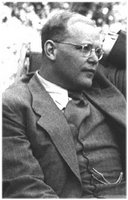
I applied my mind to study and to explore by wisdom all that is done under the heavens. (Ecc. 1:13a)
His decision to study theology and serve the church was reached by the time he was 16 years old. By the age of 25 he had written two doctoral dissertations. Born the son of a psychiatrist, the sixth of eight children, his father and siblings had little regard for a religious vocation. Nevertheless, the young Dietrich Bonhoeffer was resolute, stating boldly to his brothers “if the church is feeble I shall reform it.”
Bonhoeffer strikes me as a man of conviction and courage. His resistance to Hitler’s regime and his critique of the German church that so readily wed itself to the Reich proved costly. Boehoeffer’s life ended at the age of 39 – hanged in the concentration camp at Flossenburg only two weeks before allied forces liberated Germany.
Without question, the conviction and courage were real. And yet, mingled with these were questions. In prison Bonhoeffer composed a poem titled “Who Am I?” In the poem Bonhoeffer ponders the the chasm between his outer persona - cheerful, friendly, calm and controlled – and his inner turmoil and fatigue and yearnings. Bonhoeffer asks, “Who am I? Am I one person today and another tomorrow?” He finally concludes with these lines
Who am I? They mock me these lonely questions of mine.
Whoever I am, thou knowest, O God, I am thine.
There is a way of asking the hard questions that can either alienate us from God or drive us closer to God. What Bonhoeffer shares in common with Solomon is that both men asked their questions God-ward. And in the end, after the questions are asked, what remains is God. More than answers that solve and explain – there is always God. Wherever our questions take us, God holds us fast and meets us in those places.
Prayer: Father, we thank you that even in our questions you hold us fast. We thank you that in the quest for elusive answers we can know with confidence that we belong to you. Amen.


